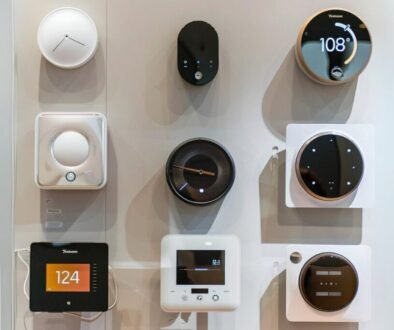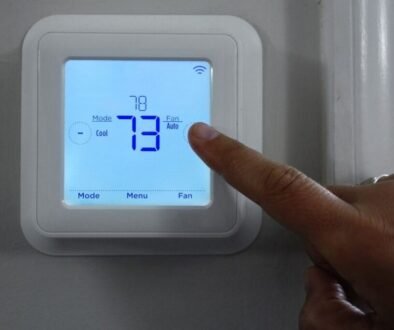Is CO2 Refrigeration The Future of HVAC Systems? Let’s Find Out!

Published November 7, 2023
In the quest for more environmentally friendly solutions, the Heating, Ventilation, and Air Conditioning (HVAC) industry is exploring innovative alternatives to traditional refrigeration systems.
Among these, CO2 refrigeration, also known as transcritical systems, is emerging as a promising contender. But is CO2 refrigeration the future of HVAC systems? Let’s find out!
Understanding CO2 Refrigeration
CO2 transcritical booster systems are designed so that medium-temperature (MT) compressors discharge into a gas cooler, typically located on the roof of a facility. Unlike subcritical systems, transcritical CO2 systems include a gas cooler to dissipate heat and utilize a high-pressure expansion valve.
CO2, or carbon dioxide, offers high heat exchange and low pumping power when used as a secondary fluid. This makes it an efficient alternative to conventional synthetic refrigerants, such as hydrofluorocarbons (HFCs), linked to ozone layer depletion and global warming.
Why Use CO2 as Refrigerant?
CO2 as a refrigerant is gaining traction in the HVAC industry thanks to its unique properties and environmental benefits. Here are several compelling reasons why you might consider using CO2 as your refrigerant of choice:
1. Efficiency
CO2, also known as R744, has low kinematic and dynamic viscosity, allowing it to flow more efficiently. This results in less energy consumption for compression and decompression.
2. Effective Cooling Properties
CO2’s physical properties, including its sizeable refrigerating capacity per unit volume, high thermal conductivity, and high heat capacity at constant pressure, make it highly effective at removing heat. Its low surface tension also improves heat transfer capabilities.
3. Compact System Design
The small volume of CO2 allows for compact system designs, making it a practical choice for various applications.
4. Environmentally Friendly
As a natural substance, CO2 is a much greener option compared to synthetic refrigerants like hydrofluorocarbons (HFCs), which contribute to global warming and ozone layer depletion.
Additionally, CO2 is abundant and easy to source, reducing the environmental impact associated with its production.
5. Safety
CO2 is non-flammable and non-toxic, minimizing the risk of fire or poisoning commonly associated with other refrigerants.
6. Versatility
There are various types of compressors compatible with CO2, including piston, rolling piston, swing piston, scroll, vane, and screw compressors. This range offers flexibility to suit different applications and requirements.
The Environmental Edge
One of the most compelling arguments for CO2 refrigeration systems is their environmental impact — or, rather, the lack thereof. CO2 has a Global Warming Potential (GWP) of 1, significantly lower than most synthetic refrigerants. Furthermore, since CO2 systems use less HFC refrigerants than traditional direct expansion systems, they can dramatically minimize the potential for refrigerant leaks.
Applications and Efficiency
At present, CO2 refrigeration technology is primarily applied in three areas:
1. Automobile Air Conditioning
CO2 has been adopted as a refrigerant in automotive air conditioning systems due to its low global warming potential (GWP) and high efficiency. Compared to traditional HFCs, CO2 can provide the same cooling effect while using less energy, making it an eco-friendly solution for vehicle air conditioning.
2. Heat Pumps
Heat pumps are devices that transfer heat energy from a source of heat to a destination called a “heat sink.” CO2-based heat pumps offer several advantages over conventional ones, including higher heating capacity and greater efficiency, particularly in colder climates. They also have a lower environmental impact due to CO2’s natural properties.
3. Multi-Stage Refrigeration Systems
These systems use multiple compression stages to cool large spaces, such as warehouses or supermarkets. CO2 is an excellent choice for multi-stage refrigeration because it can work efficiently under varying pressure levels, making it ideal for systems that maintain different temperatures in different areas.
In colder climates, these systems can achieve equal or better efficiency than synthetic refrigerant systems at condensing temperatures at or below certain levels.
However, it’s worth noting that CO2 refrigeration systems typically operate under higher pressures than traditional systems, which can require special safety considerations and equipment.

Challenges and Solutions
While the benefits of CO2 refrigeration are clear, challenges must be addressed. For instance, pressure management can be an issue, as evidenced by cases where the CO2 pressure reading in a system was 350psi, leading to the relief valve opening up about once every 10 minutes.
Yet, the HVAC industry is rising to these challenges. With ongoing research and development, solutions are being found to maximize the potential benefits of CO2 refrigeration and ensure its safe and efficient operation.
You might also want to read: HVAC Troubleshooting: DIY Fixes for Common Issues.
A Sustainable Future
In conclusion, CO2 refrigeration systems provide an environmentally friendly alternative to traditional centralized direct-expansion (DX) systems. While there are challenges to overcome, the potential benefits of CO2 refrigeration systems — including their lower GWP and high efficiency — make them a promising option for the future of the HVAC industry.
So, is CO2 refrigeration the future of HVAC systems? Only time will tell, but the signs indeed point in that direction.

This Content Is Fact Checked
This content has undergone thorough fact-checking by our team of internal experts. Gain further insight into the editorial standards upheld on our website here.
South Florida HVAC Professionals
Snowflakes Air Conditioning has been providing professional HVAC services for over 10 years. We are committed to keeping your air conditioner running smoothly all year round. Our experienced technicians can handle anything from AC repair to sales and AC installation. Whether it’s time for an upgrade or just regular upkeep, we are a name you can trust for your HVAC needs. Contact us today for more information.

About The Author
Meet writer Rei Bayucca, an HVAC and construction industry enthusiast. Discover insightful articles designed to help you solve your most pressing problems. Rei can captivate you with expertly crafted content that will leave you hungry for more.



